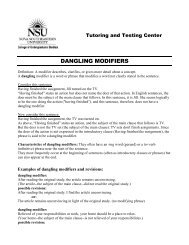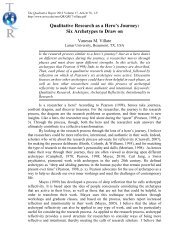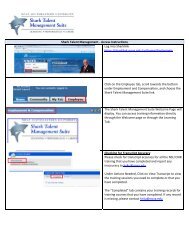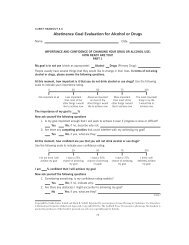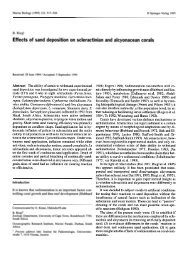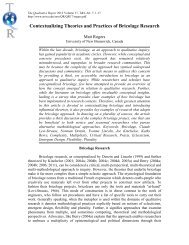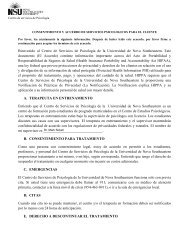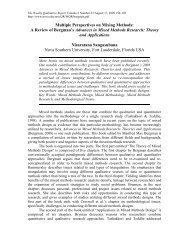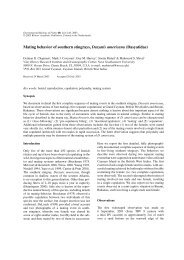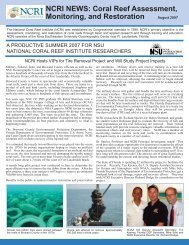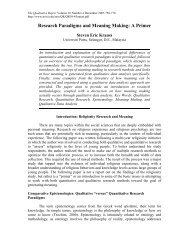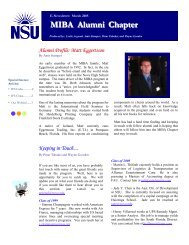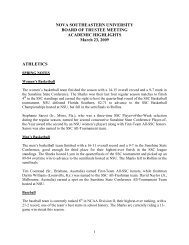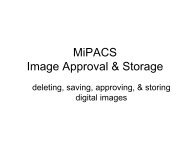11th ICRS Abstract book - Nova Southeastern University
11th ICRS Abstract book - Nova Southeastern University
11th ICRS Abstract book - Nova Southeastern University
Create successful ePaper yourself
Turn your PDF publications into a flip-book with our unique Google optimized e-Paper software.
21.807<br />
The Recreational Value Of Coral Reef in The Wider Caribbean: A Classical And<br />
Bayesian Approach To Meta-Analysis And Benefit Transfer<br />
Luz LONDONO_DIAZ* 1<br />
1 Agricultural and Natural Resources Economics, <strong>University</strong> of Connecticut, Storrs, CT<br />
Meta-analysis and benefit transfer are increasingly being used by researchers and policy<br />
makers in seeking the estimation of environmental values, as well as the adjustment of<br />
welfare measures for transferring to different policy contexts. The need for transfer<br />
values is justified by the absence of valuation studies in specific policy sites, perhaps due<br />
to budgetary constrains. The Caribbean features both: the existence of a number of coral<br />
reefs valuation studies, and the urgent need for mechanisms to curb the degradation of<br />
these ecosystems. Thus, it constitutes a call for a critical statistical synthesis of existing<br />
value estimates as well as for testing the validity of value transfer across policy sites. This<br />
paper investigates the validity and robustness of value transfer based two methodological<br />
approaches: the classical meta-regression analysis and a Bayesian model, applied on the<br />
recreational value of coral reef in the wider Caribbean. The results show that transfer<br />
techniques are enhanced under the Bayesian approach, offering higher accuracy in the<br />
transfer of recreational benefits, even in the presence of a small meta-sample.<br />
21.808<br />
Food Habit in The Coastal Zones Of The Arid Tropics<br />
Hiroshi NAWATA* 1<br />
1 Research Institute for Humanity and Nature, Kyoto, Japan<br />
I analyzed resource patch accessibility and availability in the coastal zones of the arid<br />
tropics, focusing on human-camel relationships in coral reef and mangrove ecosystems<br />
(Nawata, 2006). In this paper, I reveal a general framework of human food habit in the<br />
coastal zones of the arid tropics, based on the case study of the Beja on the Sudanese Red<br />
Sea coast. Economic production of the Beja depends mainly on their herds of camels,<br />
cattle, sheep, and goats. Although many people practice some cultivation of sorghum and<br />
pearl millet, some also engage in fishing on the seashore. Their food habit consist of; i)<br />
drink, sesoning and spice; ii) pastoral products such as milk, milk products, meats and<br />
eggs; iii) agricultural products such as cereals, beans, vegetables and fruits; iv) hunting,<br />
gathering and fishing products such as insects, land reptiles, birds, land mammals, sea<br />
reptiles, sea mammals, sea fishes and sea shells; v) human flesh referred in oral history.<br />
The most interesting aspects of food habit in the coastal zone of the arid tropics are<br />
human dependence on sea products of hunting, gathering and fishing. Therefore, in terms<br />
of arid land food production, we should reconsider much possibilities of development in<br />
sea products as principal element of the diet for the future.<br />
Poster Mini-Symposium 21: Social-Ecological Systems<br />
21.809<br />
Marine Resource Dependence, Resource Use Patterns And Identification Of Economic<br />
Performance Criteria Within A Small Island Community: Kaledupa, Indonesia<br />
Leanne CULLEN* 1,2 , David SMITH 2 , Jules PRETTY 3<br />
1 Sustainable Ecosystems, CSIRO, Cairns, Australia, 2 Coral Reef Research Unit, <strong>University</strong> of<br />
Essex, Colchester, United Kingdom, 3 Centre for Environment and Society, <strong>University</strong> of Essex,<br />
Colchester, United Kingdom<br />
Marine resources in the Wakatobi Marine National Park, Indonesia, are heavily relied upon for<br />
food, raw materials and income. Most marine ecosystems in the region are regarded healthy, but<br />
there is concern over the rapid deterioration of some of the more accessible areas of reef,<br />
mangrove and seagrass. Several management initiatives have been attempted, with little<br />
success.<br />
A major reason why past conservation management initiatives have failed to reach their goals is<br />
lack of compliance of local communities to management rules and regulations. This is due<br />
largely to actual, perceived, or expected, economic losses to communities utilising natural<br />
resources for their own sustainability. Hence a key role of management should be to maintain or<br />
improve the economic status of local people.<br />
The development of a simple series of economic performance criteria, i.e. testable parameters<br />
through which changes could be identified would allow economic status to be assessed. If<br />
appropriate methods can be developed, values generated could be used to implement<br />
economically and ecologically sound management practices with stakeholder support. To work<br />
towards this aim we need to understand local resource use patterns and economic importance,<br />
quantify local dependence, and describe existing livelihood strategies.<br />
This study used the example of the Kaledupa sub-district, Indonesia, to provide a detailed case<br />
study of a small island community with high natural resource dependence. The study details<br />
natural resource use patterns and the extensive local complexities that must be understood for<br />
any chance of management success, it also highlights the importance of marine resources to the<br />
local economy. A series of economic performance criteria were identified which could be used<br />
in the development of appropriate management plans that aim to maintain ecological wealth and<br />
develop sustainable utilisation, whilst maintaining or improving the economic status of local<br />
user groups and maintaining local participation and support.<br />
21.810<br />
An Interdisciplinary Approach To Reef Conservation<br />
Philipp TAVAKOLI* 1<br />
1 Interdisciplinary Studies, North Carolina State <strong>University</strong>, Raleigh, NC<br />
The objective of this paper is to illustrate the importance of extending reef conservation efforts<br />
to the adjacent coastal communities, and in particular of including socio-economic factors.<br />
This paper presents the case study of Koh Tao, Thailand. The method is interdisciplinary: reef<br />
surveys, using the REEF CHECK method, are linked to environmental issues and socioeconomic<br />
factors on the island. The study examines the mutual cause-effect relationships<br />
among these issues on a local level and ignores global factors, such as climate change.<br />
The island of Koh Tao is a global center of scuba diving; it probably receives more divers<br />
annually than any other destination. The island has not yet followed the trend of massive<br />
development of other major tourist destinations, and most reefs are still in good condition.<br />
However, development has been growing rapidly over the past few years. The sheer amount of<br />
divers, the diesel from the dive boats, and the increasing run-off are taking their toll on the<br />
reefs. In brief, this study shows how the locals’ lack of education and of appreciation for the<br />
reef itself, social community issues, and the very limited scope of economic opportunities,<br />
prevent sustainable development and result in reef deterioration. These factors are further<br />
reinforced by the transient nature of the dive industry. In return, the deterioration of the reefs<br />
results in increasing economic hardship, social tensions in the community, and even fewer<br />
opportunities for advancement, such as education, for the local people. Reefs as well as people<br />
are caught in this downward spiral. Reef ecosystems and human communities are closely<br />
intertwined and the well being of one depends on the well being of the other.<br />
The analysis of cause-effect relationships then provides valuable guidance for sustainable<br />
development and ecotourism which ultimately foster reef conservation.<br />
466



